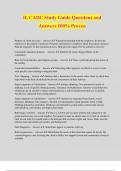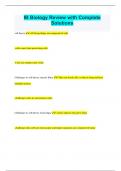IL CADC Study Guide Questions and
Answers 100% Proven
Purpose of client advocate - Answer ✔️✔️-Formal relationship with the employer, Involve the
employer in the patient's treatment, Promote information to employer about the patient's disease,
Educate employer on the treatment process, Help provide support for the patient in recovery
Community education purpose - Answer ✔️✔️-Identify the major drug problems in the
community
Role for local churches and religious groups - Answer ✔️✔️-Start a self-help group that meets in
the facility
Counselor responsibilities - Answer ✔️✔️-Educating other agencies on effective ways to work
with specific cases relating to drugs/alcohol
Two- Stepping - Answer ✔️✔️-Defense that is destructive to the newly sober client in which they
help others with their alcoholism but do not concentrate on their sobriety
Signs/symptoms of Alcoholism - Answer ✔️✔️-Solitary drinking, Over permissive norms of
drinking, Lack of specific drinking norms, Tolerance of drunkenness, Adverse social behaviors,
Utilitarian use of alcohol to reduce tension/anxiety, Lack of ritual/ceremonial use of alcohol,
Alcohol use separated from eating patterns
Signs/symptoms of Alcoholism - Answer ✔️✔️-Alcohol use separated from family, social
functions, Drinking with strangers, Alcohol not introduced in small amounts when a child,
Drinking pursued as recreation, Drinking concentrated in young males, Culture that stresses
individualism, self-reliance and high achievement
Referring to AA/NA - Answer ✔️✔️-Have a AA/NA person meet w/them and explain how the
group and recovery can work together, Not proper to refer an atheist since it is built on a belief in
God, do not refer if it would seem to be disrespectful of clients rights and views, Make sure the
referral meets the clients personality and background
Dual Diagnosis - Answer ✔️✔️-Sometimes appear as patients sober up
Referral processes - Answer ✔️✔️-Identifying the needs of the client that cannot be met by the
counselor/agency and Assisting the client to utilize the support system and community resources
available
,Discharge summary is needed - Answer ✔️✔️-Inpatient, aftercare, detox, half way houses, etc,
Communications from one agency to another and increases accountability, Reports and record
keeping tells the story of the client from beginning to end, No universally accepted format for
maintaining records
Reports - Answer ✔️✔️-Explains various aspects of the assessment, treatment plans, and
discharge to parties who need such information to enhance the care of the client
Documents patient can sign - Answer ✔️✔️-Consent for treatment, Public aid, DASA, statistics,
Treatment plans, Release of information, To acquire medical attention, Education/prevention,
Client education, Crisis intervention
Patient has a right to - Answer ✔️✔️-Treatment costs they are liable for, When treatment services
are available, Types of counseling approaches used, Opportunity to complain to appropriate staff
Client files - Answer ✔️✔️-Only the clinical supervisor has unrestricted access to client's files
Physiological dependence for alcohol- Alpha - Answer ✔️✔️-Psychological dependence, no loss
of control, reliance on alcohol to weather problems
Physiological dependence for alcohol- Beta - Answer ✔️✔️-Psychological dependence, physical
problems (cirrhosis) but no physical dependence
Physiological dependence for alcohol - Gamma - Answer ✔️✔️-Change in tolerance, physical
withdrawal, loss of control. Use for Jellinek Chart with 4 stages
Physiological dependence for alcohol - Delta - Answer ✔️✔️-Same as Gamma but no loss of
control but drinks
Physiological dependence for alcohol - Epsilon - Answer ✔️✔️-Periodic alcoholism/binge
drinking
Aversive therapy - Answer ✔️✔️-Disulfiram/Antibuse - Most effect for binge drinkers and No
alcohol for 2 weeks or severe allergy reactions occur
Direct Reinforcement - Answer ✔️✔️-Providing positive feedback and rewarding in a direct way
and Introducing new and competing behaviors to replace negative behaviors
Analytic therapy - Answer ✔️✔️-Oriented toward achieving insight, identifying and experiencing
feelings, memories developing, in-depth self-understanding, re-experiencing, reconstructing
childhood experience, Not appropriate for first month of counseling
Erickson's Psychological Theory - Answer ✔️✔️-Trust vs Mistrust; Autonomy vs Doubt;
Initiative vs Guilt; Industry vs Inferiority; Identity vs Role Diffusion - Adolescent; Intimacy vs
Isolation - Adult; Generativity vs Stagnation - Adult; Integrity vs Despair - Old age
,Social Learning - Answer ✔️✔️-Behavior learned through interaction with other people, peer
group, AA group, group therapy
Cognitive Restructuring - Answer ✔️✔️-Positive affirmations spoken to self to modify negative
thoughts
Reality Therapy/Transactional Therapy (Glasser 1960s) - Answer ✔️✔️-What is going on "here
and now", How a client can change old patterns, Client makes decisions based on awareness
Maslow - Self-actualization - Answer ✔️✔️-Teaches person to challenge old ideas and
replace/internalize logic or science
Gestalt Therapy - Answer ✔️✔️-Increase awareness of feelings, Persons are born innately good,
Focuses on unfinished business, Focus on "what and how" and not "why". Client's are to be
aware of what they are doing, how they are doing it and the gaining of self-esteem. No diagnosis
or interpretation
Carl Rogers - Answer ✔️✔️-Persons need self-fulfillment rather than being occupied with others
Relaxation Therapy - Answer ✔️✔️-If body and breathing are relaxed it is impossible to feel
anxious, Tensing and then relaxing muscles
Systematic Desensitization - Answer ✔️✔️-Used w/relaxation for treating phobias
Adlerian Therapy - Answer ✔️✔️-Concept of inferiority complex, Encouragement to recognize
strengths and weaknesses, Believes in dignity and self-worth, Mainly used in family counseling
Client Centered "Rogerian Therapy" - Answer ✔️✔️-Based on assumption that the client is in the
best position to resolve their own problems, Safe atmosphere to feel/discuss and obtain insight is
provided
Jungian Therapy - Answer ✔️✔️-Developed the concept of collective unconscious and
archetypes, Goal is to have clients become adequately adopted to reality allowing them to fulfill
their creative potential, Individuation is the ultimate goal
Vernon Johnson's Therapy - Answer ✔️✔️-Learning theory; Individual learns that drinking is a
successful way to deal w/problems, Family, etc in the addict's life reinforces this by their
behaviors which enables the alcoholic's drinking, Relationship w/alcohol deteriorates over time,
but the learning was so powerful the person continues to seek those early positive experiences
that are not there now
It is essential to have an atmosphere of high ethical standards - Answer ✔️✔️-Establishes a
mutual respect during treatment, Using therapy techniques and interventions that lack data are
unethical.
Transference - Answer ✔️✔️-Counter-transference becomes unethical when the counselor's
unresolved conflicts get in the way of effective therapy.
, Unethical - Answer ✔️✔️-Impose values on the client that are not already theirs, Counselors are
to refer clients when they can't refrain from imposing views other than the client's
Family and Friends - Answer ✔️✔️-Counselors are not to treat family or friends due to biased
opinions they would have.
Counselor presentations - Answer ✔️✔️-Counselors are not to reveal client's identity during
teaching or speaking engagements.
MMSE - Answer ✔️✔️-Mini Mental Status Exam that measures: Appearance, affect, thought,
content and mood
Counselor relapse - Answer ✔️✔️-When a counselor in recovery has relapsed they are suspended
from their duties and are told to see the EAP - Employee Assistance Program.
Burn Out - Answer ✔️✔️-Over involvement with the clients (sign of codependency), Working
extra hours, Lack of therapeutic success, Tedious work, Tendency of therapeutic work to being
out own conflicts
Ellis - Answer ✔️✔️-Stress of mental health professionals is primarily related to irrational beliefs
Burn Out - Answer ✔️✔️-Burn out can be avoided by moving from direct care to an
administrative position.
4 Stages of Alcoholism - Answer ✔️✔️-1) Pre-Alcoholic
2) Prodromal Phase
Black outs occur during promodal
3) Crucial Phase
4) Chronic Phase
BECK - Answer ✔️✔️-Used for Depression
MAST - Answer ✔️✔️-Tests Alcoholism
Neuroleptic Drugs - Answer ✔️✔️-Used for Schizophrenia
Common Belief - Answer ✔️✔️-Problems in life came first and alcohol was used because of their
denial and the want to relieve their problems
Reality - Answer ✔️✔️-Addiction was first and created the problems
Referral process - Answer ✔️✔️-Have patient sign a release of information, Offer to make the
initial contact, Share the information you have with referral agency, Follow up





